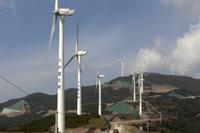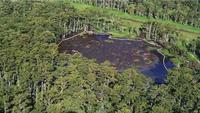-
Camera for long-range gas leak detection

New infrared gas imaging camera equipped with a 75 mm lens; it iscertified for use in Class I Div 2 hazardous locations, enabling remote detection and visualization of gas leaks from a great distance
-
-
U.S. nuclear industry believes its on the threshold of a renaissance
Following the March 2011 Fukushima nuclear disaster, doubts were raised about the future of the U.S. nuclear power industry; now, eighteen months later, a new poll, and changes in NRC’s reactor design approval procedure, have convinced industry leaders that nuclear power could become a significant source of power in the United States
-
-
The administration set to issue a cybersecurity executive order

President Obama issued a proclamation the other day making October National Cyber Security Awareness month. The administration’s efforts to push a cybersecurity bill through Congress, however, have so far failed, so the administration is opting for a solution other administrations have adopted in the face of a recalcitrant Congress: executive order
-
-
China’s infrastructure is failing owing to sub-standard materials, corruption, and lax regulation
Shoddy infrastructure in China has put people in danger time and time again; many of the infrastructure issues in China stem from the government’s focus on quantity over quality, as well as making sure that as many people are employed as possible for a project, rather than using the latest construction technology; sub-standard materials, corruption, and lax regulation only exacerbate the problem
-
-
City of Ottawa sits atop soft soil, a geologic features which amplifies seismic waves

Roughly 20 percent of the Ottawa area is built on bedrock, while the remaining area contains unconsolidated surface deposits; this is not good news for city planners – and dwellers – because soft soil amplifies seismic waves, resulting in stronger ground motion than for sites built over bedrock
-
-
Assessment reports mineralization of 2.173 million tons rare Earths elements in Idaho, Montana
U.S. Rare Earths, Inc. announced the other day the final results of an independent analysis of historic exploration work done on its Idaho and Montana properties
-
-
Innovative, “complete” solution for oil-spill cleanup
Corncobs, straw, and other absorbents used to clean up oil spills can hold only about five times their own weight and pick up water, as well as oil; scientists describe what may be a “complete solution” to cleaning up oil spills — a superabsorbent material that sops up forty times its own weight in oil and then can be shipped to an oil refinery and processed to recover the oil
-
-
Obama blocks purchase of U.S. wind farms by Chinese company

Last Friday President Barack Obama blocked a Chinese company from owning four wind farm projects in northern Oregon; Obama cited security risks for the action, making it the first time in twenty-two years that a U.S. president has blocked a foreign business deal
-
-
The Western hemisphere’s largest seawater desalination plant to be built in California

The San Diego County Water Authority announced plans to build the Western hemisphere’s largest seawater desalination plant; the plant will produce fifty million gallons of fresh water per day, enough to supply about 7 percent of the San Diego region in 2020
-
-
New study tracks long-term sea-level rise
Greenhouse gas emissions up to now have triggered an irreversible warming of the Earth which will cause sea-levels to rise for thousands of years to come, new research has shown; mankind has already committed itself to a sea-level rise of 1.1 meters by the year 3000 as a result of greenhouse gas emissions up to now; this irreversible damage could be worse, depending on the route we take to mitigating emissions
-
-
Trading water: the pros and cons
Water is a commodity, and water rights can be freely traded in an open market. Proponents of the free market approach argue that it leads to the most efficient allocation of water resources, as it would for any other commodity
-
-
Former DHS official says U.S. should go on cybersecurity offensive
Stewart Baker, the first assistant secretary for policy at DHS under President George W. Bush, has a straightforward theory when it comes to cyber security in the United States: “To prevail in the cybersecurity war, defense is not enough”; not all cuber experts agree with him
-
-
Experts warn of growing cyber security risks to U.S., criticize Congress’s inaction
U.S.and Russian cyber experts are trying to scare officials into improving cybersecurity protection in the United Statesand around the world; cyber attacks against critical infrastructure escalate in scope and severity; soon, Kaspersky Lab’s Eugene Kaspersky said: “If previous viruses were like bicycles,then the Stuxnet worm that damaged uranium enrichment centrifuges at the Natanz plant in Iran two years ago would be a plane and the latest programs, dubbed Flame and Gauss,would be space shuttles”
-
-
Experts trying to determine cause of a giant Louisiana sinkhole

The earth near Bayou Corne, Louisiana opened on 2 August: a 300-foot-wide sinkhole, with depth varying between 50 and 300 feet, suddenly opened up in an area, and the authorities have been trying to determine whether the sinkhole was caused by the collapse of an abandoned brine mining cavern along the margin of the Napoleonville Salt Dome or by something else
-
-
Pentagon says privately owned computer networks vulnerable to attack

Deputy U.S. Defense Secretary Ashton Carter told hundreds of industry executives and military officials at a conference that he is concerned with the potential of a cyber attack on privately owned U.S. computer networks; “I hope this isn’t one of those situations where we won’t do what we need to do until we get slammed,” Carter said
-
More headlines
The long view
Water Wars: A Historic Agreement Between Mexico and US Is Ramping Up Border Tension
As climate change drives rising temperatures and changes in rainfall, Mexico and the US are in the middle of a conflict over water, putting an additional strain on their relationship. Partly due to constant droughts, Mexico has struggled to maintain its water deliveries for much of the last 25 years, deliveries to which it is obligated by a 1944 water-sharing agreement between the two countries.
Trump Is Fast-Tracking New Coal Mines — Even When They Don’t Make Economic Sense
In Appalachian Tennessee, mines shut down and couldn’t pay their debts. Now a new one is opening under the guise of an “energy emergency.”
Smaller Nuclear Reactors Spark Renewed Interest in a Once-Shunned Energy Source
In the past two years, half the states have taken action to promote nuclear power, from creating nuclear task forces to integrating nuclear into long-term energy plans.
Keeping the Lights on with Nuclear Waste: Radiochemistry Transforms Nuclear Waste into Strategic Materials
How UNLV radiochemistry is pioneering the future of energy in the Southwest by salvaging strategic materials from nuclear dumps –and making it safe.
Model Predicts Long-Term Effects of Nuclear Waste on Underground Disposal Systems
The simulations matched results from an underground lab experiment in Switzerland, suggesting modeling could be used to validate the safety of nuclear disposal sites.
